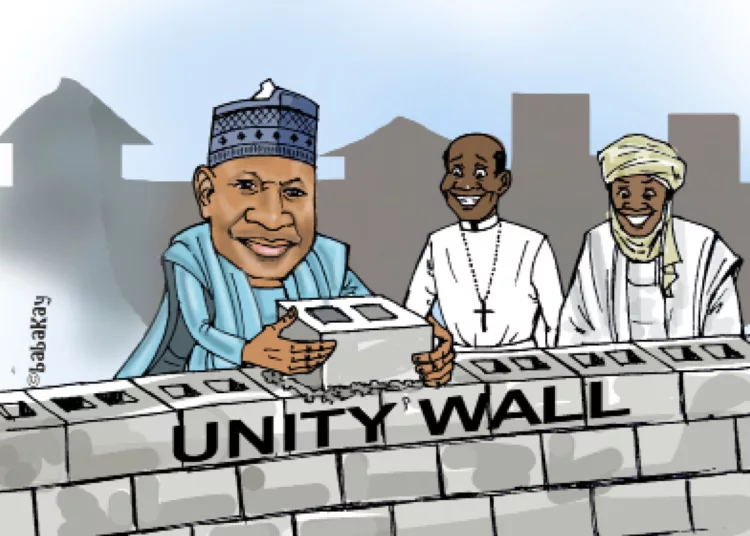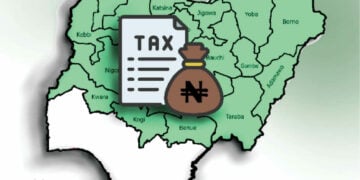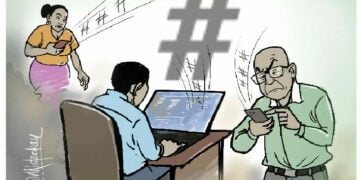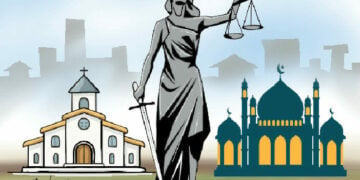Amidst the winter of disillusionment and anguish that ripped across Kaduna State during the administration of Mallam Nasir Ahmed el-Rufai, not many expected a new vista of hope so soon for a state that had come to epitomize vicious division among once peace-loving citizens whose humanity was seen in their cosmopolitan upbringing and friendship spanning over a century.
Before the emergence of the former Federal Capital Territory (FCT) Minister as governor in 2015, Kaduna State was not a complete haven, as the subtle manipulation of religion and ethnicity, among other fault lines, by politicians had turned the state into a slippery ground for ethnic and religious tension that saw the balkanisation of the capital city into Muslim and Christian strongholds, with the former dominating the northern section, and the latter dominating the southern part.
Instead of de-emphasising on these ferocious divisions that was tactfully managed during the 16 years of the Peoples Democratic Party (PDP), promoters of ethnic and religious tensions that were hitherto enfeebled, got emboldened and bolstered by the actions and inactions of the el-Rufai government, thus culminating into Kaduna earning a sobriquet for being ‘Nigeria’s Headquarters of Kidnappings and Banditry’.
Charting a new path
A week before Christmas, Governor Uba Sani shook the tables when he attended the ‘Kaduna Unity Carol of Nine Lessons’ that was organised by the Kaduna State Chapter of the Christian Association of Nigeria (CAN) at the ECWA English Service Church in Sabo, Chikun Local Government Area. This act is the first in the history of the state. This rare feat by the governor demonstrates a commitment in carrying everyone along, regardless of party or religious affiliation. During the event, Senator Sani left no one in doubt that the era of Muslim-Christian dichotomy was over.
Since assuming office as governor in May, the Uba Sani-led administration has been working assiduously to rebuild trust, take development closer to the people, bring succour to the poor, underserved and vulnerable and collaborating with security forces on issues of insecurity. So far, he has shown a commitment to be people-centred and anchored on inclusiveness, with the ultimate goal of restoring Kaduna State as the melting pot for all Nigerians.
Democratic leadership is achieved when those in power come to terms with the urgency of tackling challenges confronting the people. Thus, Governor Sani, a true witness and active participant in Kaduna politics in the last eight years, is now convinced of the need to unlearn the past, trodden by his predecessor, and is now a champion of inclusive politics for peace and development.
SKFEST-2023 and new narrative
Without any iota of doubt, Southern Kaduna was the constant victim of el-Rufai’s inglorious years that deliberately introduced and solidified the deliberate isolation of a section of the state in the affairs of governance. The cascading level of hopelessness among citizens, worsened by massive destruction of public trust in leadership, promoted the enthronement of coldblooded killings and decimation of communities during the eight years of locust. If there was any form of injustice and dereliction of duties, and there were many, shameless fawners of this past, hailed from all parts, with some political appointees misleading the former governor for their pecuniary interests.
In line with the inspiring signs of what seems to be a promising future, Southern Kaduna’s 57 ethnic nationalities on Thursday commenced the maiden edition of Southern Kaduna Festival (SKFEST-2023) that aims at not only to showcase the region’s diversity, but also to celebrate their cultures. At a time when various narratives are gaining national and global traction that portray the region as fiercely opposed to inclusiveness, the relevance of this festival cannot be over-emphasised.
As the maiden edition of this festival comes to a close today, the honouring of prominent Nigerians with the Southern Kaduna Grand Commander (SKGC) award on Major General Zamani Lekwot (retd); General Martin Luther Agwai (retd) and the Catholic Bishop of the Sokoto Diocese, Dr. Matthew Hassan Kukah, including posthumous SKGC on late Governor Patrick Ibrahim Yakowa, and former Secretary to the Government of the Federation (SGF) and the Wazirin Jema’a, Alhaji Aliyu Mohammed, remains a historical watershed.
The grant of the Southern Kaduna Citizen Award (SKCA) to former Governor Ahmed Mohammed Makarfi and former Military Administrator of the state under the regime of Late General Sani Abacha, Col Jafaru Isa (retd) is commendable. Both Senator Makarfi and Col. Isah played prominent roles in creating additional chiefdoms for many communities in the region. These recognitions are a clear acceptance of the fact that the growth and development of the region was made possible by Nigerians within and beyond the shores of the region.
Keeping aflame light of unity
Beyond the carol service attended by Governor Sani and SKFEST-2023 that is to be concluded today, the path for the glory of the past is still fraught with curves of challenges. Though the governor’s presence in church remains a profound giant stride for a new narrative that seeks to enact bright relationships among Kaduna’s diverse groups for inclusiveness; the greatest challenge is getting the political class to demonstrate honesty by offering selfless service. In a country where “belle-face” politics is mainly determined by self-serving politicians; there’s a need for the electorate, now plunged into a dungeon of crippling poverty, to always unite and interrogate leadership weaknesses in order to deepen Nigeria’s democracy for the common good.





